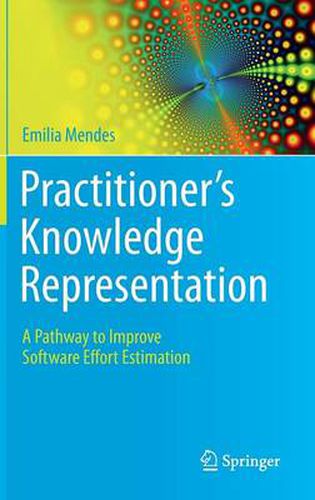Readings Newsletter
Become a Readings Member to make your shopping experience even easier.
Sign in or sign up for free!
You’re not far away from qualifying for FREE standard shipping within Australia
You’ve qualified for FREE standard shipping within Australia
The cart is loading…






This title is printed to order. This book may have been self-published. If so, we cannot guarantee the quality of the content. In the main most books will have gone through the editing process however some may not. We therefore suggest that you be aware of this before ordering this book. If in doubt check either the author or publisher’s details as we are unable to accept any returns unless they are faulty. Please contact us if you have any questions.
The main goal of this book is to help organizations improve their effort estimates and effort estimation processes by providing a step-by-step methodology that takes them through the creation and validation of models that are based on their own knowledge and experience. Such models, once validated, can then be used to obtain predictions, carry out risk analyses, enhance their estimation processes for new projects and generally advance them as learning organizations.
Emilia Mendes presents the Expert-Based Knowledge Engineering of Bayesian Networks (EKEBNs) methodology, which she has used and adapted during the course of several industry collaborations with different companies world-wide over more than 6 years. The book itself consists of two major parts: first, the methodology’s foundations in knowledge management, effort estimation (with special emphasis on the intricacies of software and Web development) and Bayesian networks are detailed; then six industry case studies are presented which illustrate the practical use of EKEBNs. Domain experts from each company participated in the elicitation of the bespoke models for effort estimation and all models were built employing the widely-used Netica ™ tool. This part is rounded off with a chapter summarizing the experiences with the methodology and the derived models.
Practitioners working on software project management, software process quality or effort estimation and risk analysis in general will find a thorough introduction into an industry-proven methodology as well as numerous experiences, tips and possible pitfalls invaluable for their daily work.
$9.00 standard shipping within Australia
FREE standard shipping within Australia for orders over $100.00
Express & International shipping calculated at checkout
This title is printed to order. This book may have been self-published. If so, we cannot guarantee the quality of the content. In the main most books will have gone through the editing process however some may not. We therefore suggest that you be aware of this before ordering this book. If in doubt check either the author or publisher’s details as we are unable to accept any returns unless they are faulty. Please contact us if you have any questions.
The main goal of this book is to help organizations improve their effort estimates and effort estimation processes by providing a step-by-step methodology that takes them through the creation and validation of models that are based on their own knowledge and experience. Such models, once validated, can then be used to obtain predictions, carry out risk analyses, enhance their estimation processes for new projects and generally advance them as learning organizations.
Emilia Mendes presents the Expert-Based Knowledge Engineering of Bayesian Networks (EKEBNs) methodology, which she has used and adapted during the course of several industry collaborations with different companies world-wide over more than 6 years. The book itself consists of two major parts: first, the methodology’s foundations in knowledge management, effort estimation (with special emphasis on the intricacies of software and Web development) and Bayesian networks are detailed; then six industry case studies are presented which illustrate the practical use of EKEBNs. Domain experts from each company participated in the elicitation of the bespoke models for effort estimation and all models were built employing the widely-used Netica ™ tool. This part is rounded off with a chapter summarizing the experiences with the methodology and the derived models.
Practitioners working on software project management, software process quality or effort estimation and risk analysis in general will find a thorough introduction into an industry-proven methodology as well as numerous experiences, tips and possible pitfalls invaluable for their daily work.